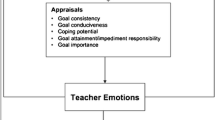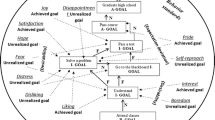Abstract
Little is known about discrete emotions experienced by mathematics teachers beyond mathematics anxiety in elementary school. In order to fill this gap, the aim of this research is to identify emotions, and their triggering situations, experienced by secondary school Mexican mathematics teachers inside and outside of the classroom. This research considered 180 written narratives of emotional experiences (positives and negatives) of 18 secondary school in-service Mexican mathematics teachers. We use the cognitive theory of emotions to identify emotions and we carry out a thematic analysis to identify the situations that trigger emotions. Results show nine positive and seven negative emotions unleashed by 28 triggering situations; the results are consistent with the research literature on teachers’ emotions that highlights that the main sources of teachers emotions are behaviour, motivation and academic achievement of their students. Their academic achievement and learning triggers happy-for, appreciation, pride and gratitude and their lack of engagement and motivation triggers disappointment, reproach and anger.

Similar content being viewed by others
References
Becker, E. S., Keller, M. M., Goetz, T., Frenzel, A. C., & Taxer, J. L. (2015). Antecedents of teachers’ emotions in the classroom: An intraindividual approach. Frontiers in Psychology, 6, 635. https://doi.org/10.3389/fpsyg.2015.00635.
Beilock, S. L., Gunderson, E. A., Ramirez, G., & Levine, S. C. (2010). Female teachers’ math anxiety affects girls’ math achievement. Proceedings of the National Academy of Sciences of the United States of America, 107(5), 1860–1863. https://doi.org/10.1073/pnas.0910967107.
Bekdemir, M. (2010). The pre-service teachers’ mathematics anxiety related to depth of negative experiences in mathematics classroom while they were students. Educational Studies in Mathematics, 75(3), 311–328. https://doi.org/10.1007/s10649-010-9260-7.
Bibby, T. (2002). Shame: An emotional response to doing mathematics as an adult and a teacher. British Educational Research Journal, 28(5), 705–721. https://doi.org/10.1080/014119202200001554.
Bieg, M., Goetz, T., Sticca, F., Brunner, E., Becker, E., Morger, V., & Hubbard, K. (2017). Teaching methods and their impact on students’ emotions in mathematics: An experience-sampling approach. ZDM - International Journal on Mathematics Education, 49, 411–422. https://doi.org/10.1007/s11858-017-0840-1.
Braun, V., & Clarke, V. (2006). Using thematic analysis in psychology. Qualitative Research in Psychology, 3(2), 77–101. https://doi.org/10.1191/1478088706qp063oa.
Braun, V., & Clarke, V. (2012). Thematic analysis. In H. Cooper (Ed.), APA handbook of research methods in psychology (Vol. 2, pp. 57–71). American Psychological Association. https://doi.org/10.1037/13620-004.
Bursal, M., & Paznokas, L. (2006). Mathematics anxiety and preservice elementary teachers’ confidence to teach mathematics and science. School Science and Mathematics, 104(6), 173–180.
Chang, M. L. (2009). An appraisal perspective of teacher burnout: Examining the emotional work of teachers. Educational Psychology Review, 21(3), 193–218. https://doi.org/10.1007/s10648-009-9106-y.
Chen, J. (2016). Understanding teacher emotions: The development of a teacher emotion inventory. Teaching and Teacher Education, 55, 68–77. https://doi.org/10.1016/j.tate.2016.01.001.
Coppola, C., Di Martino, P., Pacelli, T., & Sabena, C. (2012). Primary teachers’ affect: A crucial variable in the teaching of mathematics. Nordic Studies in Matematics Education, 17(3–4), 107–123.
Di Martino, P., Coppola, C., Mollo, M., Pacelli, T., & Sabena, C. (2013). Pre-service primary teachers’ emotions: The math-redemption phenomenon. In A. M. Lindmeier & A. Heinze (Eds.), Proceedings of the 37th Conference of the International Group for the Psychology of Mathematics Education (Vol. 2, pp. 225–232). Germany: Kiel.
Di Martino, P., & Sabena, C. (2011). Elementary pre-service teachers’ emotions: Shadows from the past to the future. In K. Kislenko (Ed.), Current state of research on mathematical beliefs XVI (pp. 89–105). Tallin: Tallinn University.
Elacqua, G., Hincapie, D., Vegas, E., & Alfonso, M. (2018). Profesión: Profesor en América Latina ¿Por qué se perdió el prestigio docente y cómo recuperarlo? [Profession: Professor in Latin America. Why was teaching prestige lost and how can it be recovered?]. Washington, DC: Banco Interamericano de Desarrollo. https://doi.org/10.18235/0001172.
Frenzel, A. C. (2014). Teacher emotions. In R. Pekrun & L. Linnenbrink-Garcia (Eds.), International handbook of emotions in education (pp. 494–519). New York, NY: Routledge.
Frenzel, A. C., Goetz, T., Lüdtke, O., Pekrun, R., & Sutton, R. E. (2009a). Emotional transmission in the classroom: Exploring the relationship between teacher and student enjoyment. Journal of Educational Psychology, 101(3), 705–716. https://doi.org/10.1037/a0014695.
Frenzel, A. C., Goetz, T., Stephens, E. J., & Jacob, B. (2009b). Antecedents and effects of teachers’ emotional experiences: An integrated perspective and empirical test. In P. A. Schutz & M. Zembylas (Eds.), Advances in teacher emotion research: The impact on teachers’ lives (pp. 129–151). Springer. https://doi.org/10.1007/978-1-4419-0564-2_7.
García-González, M. S., & Martínez-Sierra, G. (2020). The history of a teacher’s relief of his mathematics anxiety: the case of Diego. Educational Studies in Mathematics, 103(3), 273–291. https://doi.org/10.1007/s10649-020-09941-8.
Hannula, M. S., Liljedahl, P., Kaasila, R., & Rösken, B. (2007). Researching relief of mathematics anxiety among pre-service elementary school teachers. In J.-H. Woo, H.-C. Lew, K.-S. P. Park, & D.-Y. Seo (Eds.), Proceedings of 31st Annual Conference for the Psychology of Mathematics Education (Vol. 1, pp. 153–156). Seoul, Korea.
Harper, N. W., & Daane, C. J. (1998). Causes and reductions of math anxiety in preservice elementary teachers. Action in Teacher Education, 19(4), 29–38.
Hodgen, J., & Askew, M. (2007). Emotion, identity and teacher learning: Becoming a primary mathematics teacher. Oxford Review of Education, 33(4), 469–487. https://doi.org/10.1080/03054980701451090.
Intrator, S. M. (2006). Beginning teachers and the emotional Drama of the classroom. Journal of Teacher Education, 57(3), 232–239. https://doi.org/10.1177/0022487105285890.
Jackson, C., & Leffingwell, R. (1999). The role of instructors in creating math anxiety in students from kindergarten through college. The Mathematics Teacher, 92(7), 583–586.
Jacob, B., Frenzel, A. C., Stephens, E. J., & Jacob, B. (2017). Good teaching feels good — But what is “ good teaching ”? Exploring teachers ’ definitions of teaching success in mathematics. ZDM, 49, 461–473. https://doi.org/10.1007/s11858-017-0848-6.
Keller, M. M., Frenzel, A. C., Goetz, T., Pekrun, R., & Hensley, L. (2014). Exploring teacher emotions: A literature review and an experience sampling study. In P. W. Richardson, S. A. Karabenick, & H. M. G. Watt (Eds.), Teacher motivation: Theory and practice (pp. 69–82). New York, NY: Routledge.
Kunter, M., Tsai, Y. M., Klusmann, U., Brunner, M., Krauss, S., & Baumert, J. (2008). Students’ and mathematics teachers’ perceptions of teacher enthusiasm and instruction. Learning and Instruction, 18(5), 468–482. https://doi.org/10.1016/j.learninstruc.2008.06.008.
Lazarus, R. (1991). Emotion and adaptation. New York: Oxford University Press.
Lutovac, S., & Kaasila, R. (2014). Pre-service teachers’ future-oriented mathematical identity work. Educational Studies in Mathematics, 85(1), 129–142. https://doi.org/10.1007/s10649-013-9500-8.
McLeod, D. B. (1992). Research on affect in mathematics education: A reconceptualization. In D. A. Grouws (Ed.), Handbook of research on mathematics teaching and learning (pp. 575–596). New York, NY: Macmillan.
Martínez-Sierra, G., & García-González, M. D. S. (2014). High school students’ emotional experiences in mathematics classes. Research in Mathematics Education, 16(3), 234–250. https://doi.org/10.1080/14794802.2014.895676.
Martínez-Sierra, G., del García-González, M., & S. (2016). Undergraduate mathematics students’ emotional experiences in Linear Algebra courses. Educational Studies in Mathematics, 91(1), 87–106. https://doi.org/10.1007/s10649-015-9634-y.
Martínez-Sierra, G., del García-González, M., & S. (2017). Students’ emotions in the high school mathematics classroom: the appraisals in terms of a structure of goals. International Journal of Science and Mathematics Education, 15(2), 349–369. https://doi.org/10.1007/s10763-015-9698-2.
Martínez-Sierra, G., Arellano-García, Y., Hernández-Moreno, A., & Nava-Guzmán, C. (2019). Daily emotional experiences of a high school mathematics teacher in the classroom: a qualitative experience-sampling method. International Journal of Science and Mathematics Education, 17(3), 591–611. https://doi.org/10.1007/s10763-018-9879-x.
Martínez-Sierra, G., García-García, J., Valle-Zequeida, M., & Dolores-Flores, C. (2020). High school mathematics teachers’ beliefs about assessment in mathematics and the connections to their mathematical beliefs. International Journal of Science and Mathematics Education, 18(3), 485–507. https://doi.org/10.1007/s10763-019-09967-2.
Meyer, D. K., & Turner, J. C. (2006). Re-conceptualizing emotion and motivation to learn in classroom contexts. Educational Psychology Review, 18(4), 377–390. https://doi.org/10.1007/s10648-006-9032-1.
Moors, A., Ellsworth, P. C., Scherer, K. R., & Frijda, N. H. (2013). Appraisal theories of emotion: State of the art and future development. Emotion Review, 5(2), 119–124. https://doi.org/10.1177/1754073912468165.
Nias, J. (1996). Thinking about feeling: The emotions in teaching. Cambridge Journal of Education, 26(3), 293–306. https://doi.org/10.1080/0305764960260301.
Ortony, A., Clore, G. L., & Collins, A. (1988). The cognitive structure of emotions. Cambridge, UK: Cambridge University Press.
Peker, M. (2009). Pre-service teachers’ teaching anxiety about mathematics and their learning styles. Eurasia Journal of Mathematics, Science & Technology Education, 5(4), 335–345.
Pekrun, R., Goetz, T., Frenzel, A. C., & Barchfeld, P. (2011). Measuring emotions in students’ learning and performance. Contemporary Educational Psychology, 36(1), 36–48.
Pekrun, R., & Linnenbrink-Garcia, L. (Eds.). (2014). International handbook of emotions in education. New York, NY: Routledge.
Philipp, R. A. (2007). Mathematics teachers’ beliefs and affect. In F. Lester (Ed.), Handbook of research on mathematics teaching and learning (pp. 257–315). Charlotte, NC: Information Age Publishing.
Postareff, L., & Lindblom-Ylänne, S. (2011). Emotions and confidence within teaching in higher education. Studies in Higher Education, 36(7), 799–813. https://doi.org/10.1080/03075079.2010.483279.
Rodrigo-Ruiz, D. (2016). Effect of teachers ’ emotions on their students: Some evidence. Journal of Education & Social Policy, 3(4), 73–79.
Schukajlow, S., Rakoczy, K., & Pekrun, R. (2017). Emotions and motivation in mathematics education: Theoretical considerations and empirical contributions. ZDM, 49(3), 307–322. https://doi.org/10.1007/s11858-017-0864-6.
Schutz, P. A. (2014). Inquiry on teachers’ emotion. Educational Psychologist, 49(1), 1–12. https://doi.org/10.1080/00461520.2013.864955.
Schutz, P. A., & Pekrun, R. (Eds.). (2007). Emotions in education. San Diego, CA: Academic Press.
Schutz, P. A., & Zembylas, M. (Eds.). (2009). Advances in teacher emotion research: The impact on teachers’ lives. Springer. https://doi.org/10.1007/978-1-4419-0564-2.
SEP [Secretaría de Educación Pública / Secretary of Public Education]. (2017). Modelo educativo para la educación obligatoria [Educational model for compulsory education].
Sloan, T., Daane, C., & Giesen, J. (2002). Mathematics anxiety and learning styles: What is the relationship in elementary preservice teachers? School Science and Mathematics, 10(2), 84–87.
Swars, S. L., Daane, C. J., & Giesen, J. (2006). Mathematics anxiety and mathematics teacher efficacy: What is the relationship in elementary preservice teachers? School Science and Mathematics, 106(7), 306–315.
Uitto, M., Jokikokko, K., & Estola, E. (2015). Virtual special issue on teachers and emotions in teaching and teacher education (TATE) in 1985–2014. Teaching and Teacher Education, 50, 124–135. https://doi.org/10.1016/j.tate.2015.05.008.
Author information
Authors and Affiliations
Corresponding author
Rights and permissions
About this article
Cite this article
Martínez-Sierra, G., Arellano-García, Y. & Hernández-Moreno, A. Which Situations Trigger Emotions of Secondary School Mathematics Teachers?. Int J of Sci and Math Educ 20, 575–595 (2022). https://doi.org/10.1007/s10763-021-10158-1
Received:
Accepted:
Published:
Issue Date:
DOI: https://doi.org/10.1007/s10763-021-10158-1




